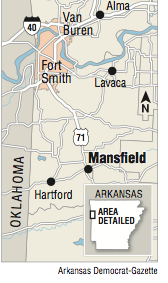The Mansfield City Council has voted to strip the mayor of many of his duties.
Council members voted 5-1 during a regular meeting Thursday night to override Mayor Larry Austin's veto last month of two measures the council passed.
During the roll call vote, councilman Nathan Sterling announced he was voting no on the veto override and he was resigning. Sterling, who was elected to the council in 2014, left the meeting without saying anything else.
Austin wouldn't give out Sterling's phone number Friday, and efforts to reach Sterling through his workplace were unsuccessful.
Arkansas Code Annotated 14-45-103 says the council must elect a replacement at its next meeting to serve out the remainder of Sterling's term.
The council at its Dec. 28 meeting amended the city's policy handbook, substituting the word "mayor" in the list of duties and powers with "recorder-treasurer," a position held in Mansfield by Becky Walker.
The council also overrode by a 5-0 vote the mayor's Dec. 28 veto of another ordinance that changed the council's regular meetings from once a month to once a week.
Council members complained about the lack of information and communication between the mayor and council members regarding city policies, and the council members wanted to meet more often to keep up with those and other matters.
After the votes on the two measures, Austin called it a "travesty" for the council to consider taking away powers given to him by the people of Mansfield.
"I have not stolen money, I have not mistreated people, regardless of what some people have said, and I have not done anything that was contrary to the policy of the city," he said.
Austin said Friday he was at work at City Hall but was unsure how things would change.
"So far, it's business as usual," he said.
City officials have criticized the mayor, who is serving the first year of a four-year term, accusing him of trying to micromanage the city, disrupting operations and causing employees to quit. Walker has said Austin ignored and bullied her.
Council members asked Austin to resign at meetings Dec. 21 and Dec. 28. The city's attorney, Matt Ketcham of Fort Smith, told them they couldn't remove Austin from office because he was elected to the position.
Walker didn't return a call Friday seeking comment on Thursday's meeting. In the invocation at the start of the meeting, Walker prayed, "Lord, we just want to do what's best for our city."
Most recently, city officials and many residents of the town of 1,139 that straddles the Sebastian-Scott county line became angry after a boil-water order last month lasted more than three weeks because of damage from a storm to the city's water storage tower.
Officials argued Austin didn't work quickly enough to get the boil order lifted. Austin defended his actions, saying he worked diligently to get the damage fixed and the boil order lifted.
The Arkansas Department of Health lifted the boil order Dec. 29, the day after the council voted to strip the mayor of his powers.
The council couldn't remove all of Austin's mayoral powers, Ketcham said. Some were granted to the office by state law, such as hiring and firing of department heads, purchasing, negotiating contracts and presiding over council meetings, he said.
Ketcham also told the council members at Thursday's meetings he planned to meet with Fort Smith attorney Joey McCutchen on a lawsuit McCutchen filed Tuesday on Austin's behalf in Sebastian County Circuit Court suing Mansfield and council members Sheri Hopkins, Rick McDaniel and Beverly Lyons.
The lawsuit accused the three council members of violating the Arkansas Freedom of Information Act by exchanging text messages with Walker to "devise a secretive and unlawful plan -- out of the public eye -- to effectively remove Mayor Austin from his position," McCutchen said in a news release.
The lawsuit claimed the text messages constituted an informal meeting for which notice to the public and media should have been given. Austin asked a judge to declare the text message exchanges a violation of the Freedom of Information Act and to issue an injunction against the officials holding informal meetings in the future.
NW News on 01/20/2018
